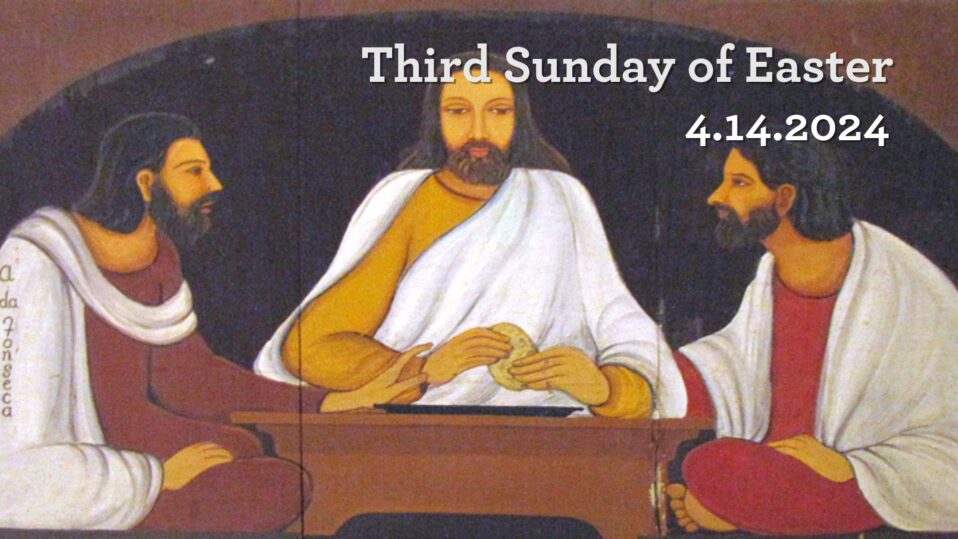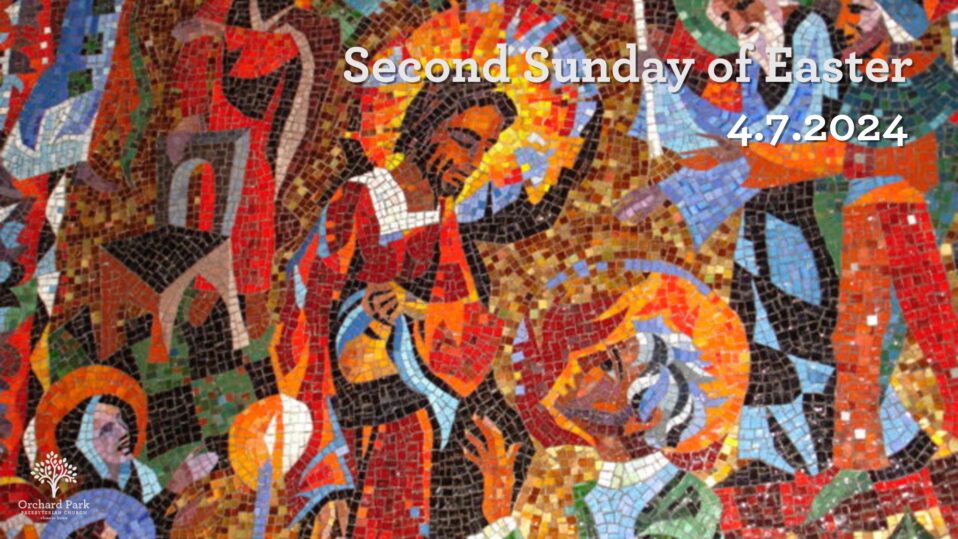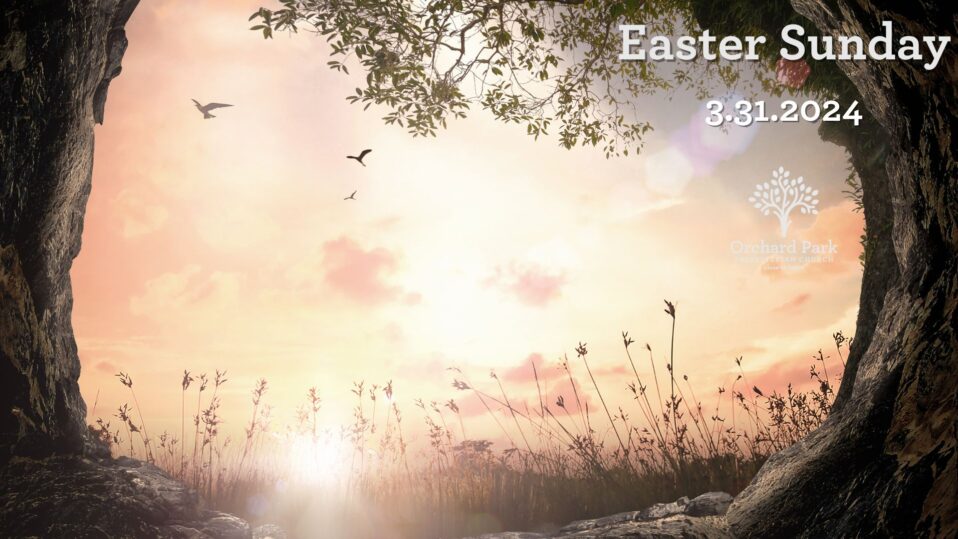I came across a story told by the late Episcoplian Bishop George Barrett. Bishop Barrett was a great leader on justice issues in the church, and he once told a story of being interviewed on television. This was in TV’s early days, when guests were asked to wear lavaliere microphones, the kind you hang around your neck. During a commercial break the sound technician came to adjust his microphone: it was banging up against the large, pectoral cross the bishop wore on his chest. The technician said, “The problem is the cross. It’s causing interference.” George Barrett looked up at him and replied, “It always does.”
This morning preachers get a choice – to preach on the parade or preach on the passion. We, at least I, often pick the parade. Good Friday will come soon enough, why get there before we have to? The cross brings down the positive vibe we are going for.
Don’t we have enough bad news already? Doesn’t everyone love a parade? The cross interferes with all of the good feelings we hunger for – like a basket of chocolate easter bunnies. But, Fred Craddock writes,
Sooner or later, somebody is going to say to you, “Then what happened to Jesus?” And when you tell them the truth, that he came to the city as a 33-year-old young idealist and stirred the city and the city turned on him and just like that put him on trial and executed him, some people are going to back away. Can’t we just leave that part out? Focus on the positive? People aren’t interested in a man who dies like that. It’s a terrible growth strategy for the church, all that, morbid suffering and bleeding and dying.
Craddock describes a big California megachurch that told the architect for their new building, “We do not want any crosses, either outside or inside. None. We don’t want anybody to think weakness or failure!”
They aren’t alone in their opinion of the cross. That’s what people thought of the cross during the days of antiquity as well. The cross was the most humiliating of punishments used for thieves and criminals in order to intimidate and keep the social order in order.
In this morning’s Gospel, Jesus tells his companions that the journey they are on will end in his death on the cross at the hands of the Roman Empire. Peter cannot abide this. “God forbid it, Lord. This must never happen to you” (Matt. 16:22). Those who follow Jesus have not reckoned on the reality of the cross as part of the transaction. Jesus knows that his critique of the empire and the religious system that colludes with it will result in his being brought to a political prisoner’s death on the cross.
Jesus knows that following him means being called into a life at odds with the forces of empire, a conflict that will result for many of his followers in persecution, martyrdom, and death. “The problem is the cross. It’s causing interference.” “It always does.”
Peter, speaking for the twelve, is in denial that Jesus will die, he’s in denial in how we will die, and he’s in denial that he will deny knowing Jesus. Tom Butcher in his book, “Burnt Coat” writes,
The human mind isn’t a terribly logical or consistent place. Most people, given the choice to face a hideous or terrifying truth or to conveniently avoid it, choose the convenience and peace of normality. That doesn’t make them strong or weak people, or good or bad people. It just makes them people.”
After the arrest in the garden and Peter’s failed attempt at defending Jesus by drawing his sword and cutting off the right ear of the high priest’s slave, he watches helplessly as the soldiers bind Jesus and lead Him away to be tried by Annus, the father-in-law of the high priest, Caiaphas.
Peter follows as did another of the disciples. Why does he follow… because he’s nervous? Because he’s hopeful? Because he can’t help but follow?
He ends up standing outside the courtyard gate of the high priest. Others are there and someone notices Peter and says, “You are not also one of this man’s disciples, are you?” Peter freezes and says, “No, I am not!” and she let him pass. So far, so good.
It was cool that evening and the others in the courtyard had made a charcoal fire to keep warm, so Peter moved in among them, as if to hide in plain sight, but again he was identified, this time by another unnamed one. In the background they could hear Annus questioning Jesus, so when asked a second time, “You are not one of His disciples, are you?” he brushed it aside, saying, “I am not.”
But then one of the relatives of the slave of the high priest whose ear he had cut off, looked at him and said, “Didn’t I see you in the garden with Him?” and when Peter denied knowing Jesus the third time the cock crowed. Perhaps others didn’t notice it, but most assuredly he did. Meanwhile, up in the interrogation room, with his hands bound, and his body stripped, Jesus closed his eyes…. And knew.
Peter is denying more than one thing here. Yes, he’s denying knowing Jesus. Yes, he’s denying that he’s one of Jesus’ disciples, but he’s also denying that this is happening at all. This is Jesus, the son of God, the one that was lifted up into the sky surrounded by Moses and Elijah, the one that has brought Lazarus out of the tomb, the one that brought site to a blind man, the one that was supposed to bring justice to their unjustice society…so this wasn’t supposed to be happening. When Peter denies knowing Jesus, he is wishing away the night, and he is afraid of those in power. I think Peter and the rest of the disciples kept waiting for a miracle that never happened.
Don’t we all do that?
I have a friend who works in the higher governing bodies of the church and she is constantly saying, we keep thinking that someone is going to come and save us, no one is coming. We keep thinking that someone or something will come and save the church. That’s not going to happen
Ten years ago, on the third Sunday of December I had a sermon already about joy and then children were massacred at Sandy Hook Elementary school. I rewrote the whole sermon on Saturday night. I talked about the tragedy and the terror of that day and the hope that this would be the last horror of its kind. A parishioner walked out and said, “everything is going to be fine.” Ten years later, and hundreds of mass shootings later, everything is not fine.
We are Easter people, we Christians are, but we live in a Good Friday world. Many have said that. We know what it means. Easter is coming, but not until Good Friday. Innocent people suffer, child sex trafficking, the opioid epidemic, war, rape, and violence are an everyday occurrence…We cannot deny—it’s a Good Friday world.
It is unfaithful to pretend or deny that any of this is untrue, simply because it makes us uncomfortable or afraid. To deny the truth of suffering is to deny the heartache of the cross.
Every time we deny the truth, Jesus closes his eyes and takes another hit.
The poet and writer Christian Wiman, who wrote his book My Bright Abyss as he fought a rare cancer, claims it is the honest humanity that Jesus shows on the cross that keeps him a Christian. Here is how he puts it:
I’m a Christian not because of the resurrection, and not because I think Christianity contains more truth than other religions, and not simply because it was the religion in which I was raised. I am a Christian because of that moment on the cross when Jesus, drinking the very dregs of human bitterness, cries out, My God, My God, why has thou forsaken me. . . . I know, I know he was quoting the Psalms. . . . The words are not the point. The point is that he felt human destitution to its absolute degree; the point is that God is with us, not beyond us, in suffering. I am a Christian because I understand that moment of Christ’s passion to have meaning in extreme human pain is an illusion. . . . I’m suggesting that Christ’s suffering shatters the iron walls around individual human suffering, that Christ’s compassion makes extreme human compassion—to the point of death, even—possible. Human love can reach right into death, then, but not if it is merely human love. . . . Such a realization should ease loneliness—even for the grieving who is left alone; it should also, in time, help to propel one back into life. (Christian Wiman, My Bright Abyss: Meditation of a Modern Believer, p. 155)
The rooster crows and the night gets more silent. Everyone has gone home. Only one light remains lit in the chief priest’s castle. There is eary calm as if the air is holding her breath. Peter stands alone and confronts the truth of what he has done, and something in him breaks, and he weeps, he weeps for what he has lost and what is come. He weeps because that is what people do when they are authentic about their pain. He weeps because he can no longer deny the interference of the cross. – And neither can we. –
Amen,
Rev. Dr. Shelly Wood



